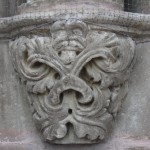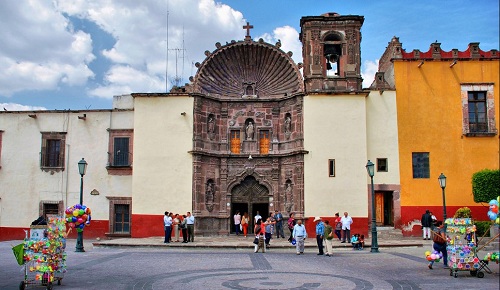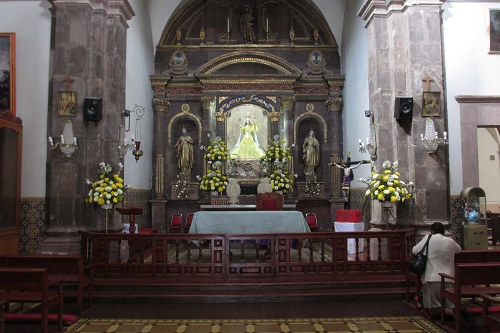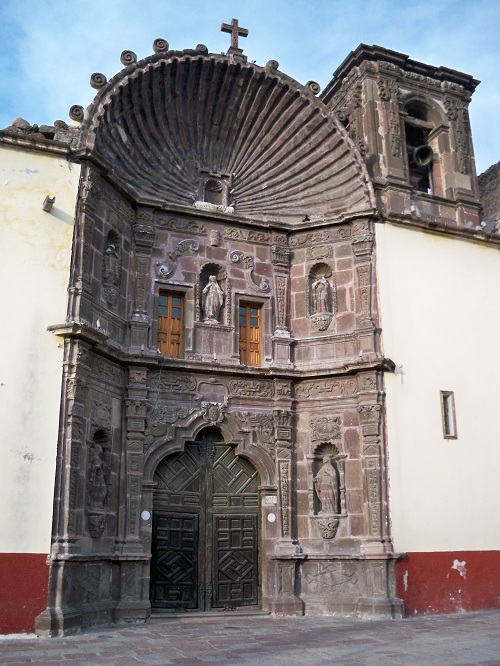There is the old adage of if you want to hide something or someone, it is best to do so in plain sight. This certainly holds true for the indigenous when building churches and wanting to appease the oppressive Spanish while also hedging their bets and placating their own gods.
I was always perplexed why the Temple of Good Health’s exterior was concave instead of protruding into what was then the town’s main market and square. Here the rare use of concave architecture represents a cave, the place where the indigenous believed this world enters the afterworld.
Look up to view the curly cues descending from the seashell. They turn into what appears to us to be the letter “M” cascading down the façade. The two represent rain and is how if you are Heaven you can communicate to your former fun-loving pals now in Hell via the rain that falls to earth and travels into the caves.
On the sides of the front door are what appear to be faces with his tongue sticking out. He is actually the indigenous god of the sun, Tonatiuh, leader of heaven. Mesoamericans believed the Sun God demanded human sacrifice as tribute and without it the sun would refuse to move through the sky. It is said that 20,000 people were sacrificed each year though this number is likely inflated either by the indigenous, who wanted to inspire fear in their enemies, or the conquering Spanish, who wanted to vilify the locals to excuse their own behavior.
Beneath him is the larger face of the God of the Wind, Ehecatl. Since the wind blows in all directions, Ehecatl was associated with all the four cardinal directions of north, south, east and west that also appear on the Virgin of Guadalupe’s dress. The Parroquia’s towering heights that appear to be upside down ice cream cones feature oval circles to allow the wind to pass through in all directions in honor of the Wind God.
Also look closely at the exterior stone work of our Lady of Good Health to view all the jaguar faces, the largest feline in the Americas. Jaguars were believed to be the only animal to communicate between the living and the dead so they are a handy animal to have around a cave, the portal to the afterlife.
More obvious, to appease the conquering Spanish, the Temple of Good Health displays Mary’s family tree starting with her pregnant in the middle, her parents (Saints Ana and Joachim) beside her, then beneath Mary are her biological son, Jesus, and her adopted son St. John. Oddly, if there ever was her husband present he long ago gamboled next door and shimmied up to the top to be the highest ranking saint on the Oratorio church.
All this symbolism of the ancient gods, saints, afterlife and caves is daily passed by visitors completely unaware of the subtle art and craftsmanship of indigenous masonry.
The symbolism doesn’t end on the outside. Inside, you’ll find another cave entrance leading the pulpit. This cave represents Jesus’ tomb and his return from the dead to read from the bible.
 On a lighter note, an alert eye can spot the frisky unicorn in the paintings of Jesus as a Good Shepherd.
On a lighter note, an alert eye can spot the frisky unicorn in the paintings of Jesus as a Good Shepherd.
It was explaining this point one day on a tour an Irish lad asked if he could use the rest room. “Of course.” I said then pausing to think “What bathroom? I’ve been in this church one thousand times and never saw a bathroom.” Then I realized he thought the Colonial era confessionals that separated the men from women were restrooms.
“Oh please” I exclaimed “don’t go to the bathroom in there!”
Joseph Toone is the Historical Society’s short-story award winning author of the SMA Secrets book series. All books in the series are Amazon bestsellers in Mexican Travel and Holidays. Toone is SMA’s expert and TripAdvisor’s top ranked historical tour guide telling the stories behind what we do in today’s SMA. Visit HistoryAndCultureWalkin




